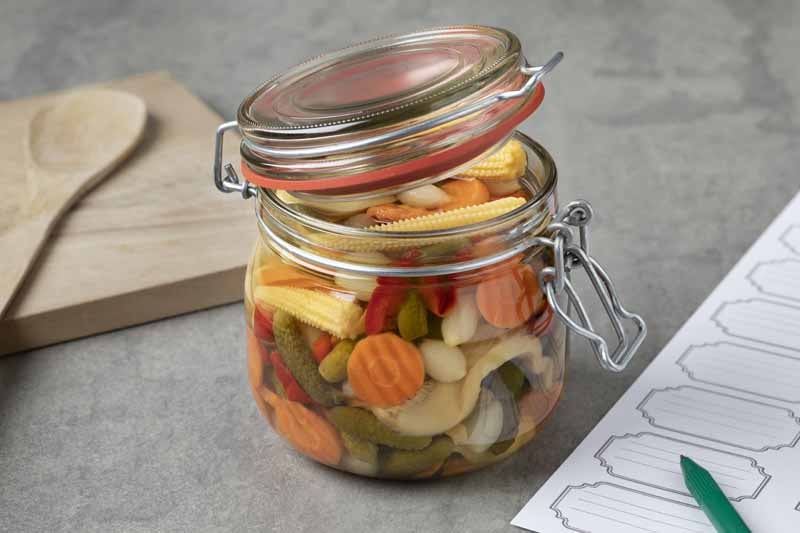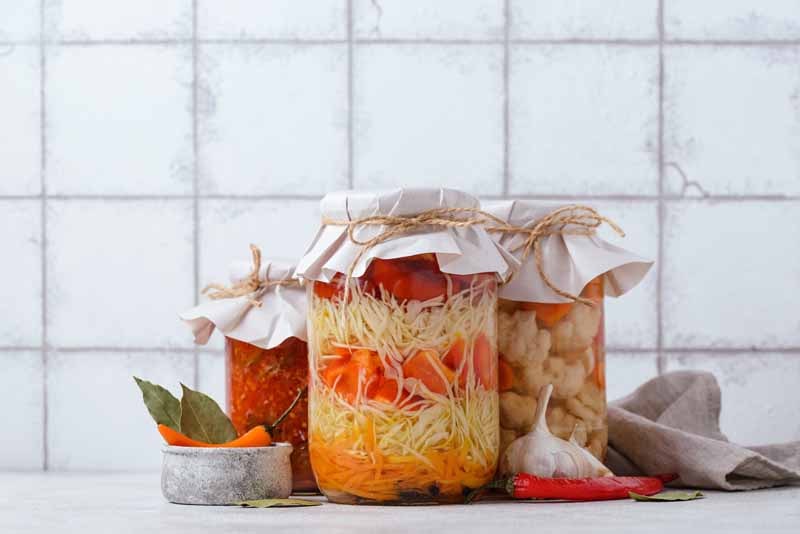Pickles are salty, sweet, sour or tangy condiments that we all love to eat. And, pickles are actually brined or salty veggies or sometimes fruits used for flavor enhancement. They are made to lock the fresh flavor of seasonal veggies or fruits by a pickling technique. But do pickles need to be refrigerated? Or, are pickles go bad if not refrigerated? These are few typical questions always come to our mind while handling pickles.
So, here in this guide, we will tell you all about your queries. Moreover, we also tell you some ways through which you can store or keep your pickles fresh for a long time. So, let’s read on and reveal the real facts.
Do Pickles Need To Be Refrigerated?
Pickles do not need to be refrigerated always. However, refrigeration is the best way to preserve the freshness and flavor of pickles. But at the same time, it also depends on the pickle quality. So, here is the simplest method to know whether your pickles need to be refrigerated or not.
If you get your favorite pickles jar from the refrigeration section of the market, put it in the refrigerator. However, if your pickles jar comes from regular shelf of the market, it needs no refrigeration.
And the fact is that fermented pickles usually have salty water or vinegar, which gives them their characteristic acidic flavor. Vinegar is a great preservative and keeps pickle fresh and flavorful. Therefore, such pickles need no refrigeration to lasts longer.
While on the other hand, quick or commercially processed pickles usually have chemicals. Such chemicals are unable to keep pickles fresh and flavorful for a long time. That’s why such pickles need to be refrigerated as they have a shorter shelf life.
How To Store Pickles
To maintain the delicious crunch and taste of pickles, store them at optimal conditions. Mostly, pickles jar left on the pantry at room temperature in the range from 30°F to 50°F. At such elevated temperature, pickles usually tend to be softened and lose their actual crunch and flavor.
Therefore, it would be best to store them at a lower temperature in the range from 30°F to 35°F. And, the refrigerator provides this lower temperature to pickles and thus increases shelf life. So, pickles need to be refrigerated to retain their whole texture and taste.
However, the storage method greatly depends on the type or quality of the product. For instance, pasteurized and unpasteurized pickles are stored by different methods.
Pasteurized pickles don’t have fermented bacteria, and thus they need no refrigeration. Such pickles remain fresh and flavorful even at room temperature. So, you can store them even out of the refrigerator in a kitchen pantry or cabinet. But be sure to keep them away from the direct sunrays or heat.
However, unpasteurized pickles do have fermented bacteria as the fermentation process is still ongoing. So, store such pickles in the refrigerator to slow down the fermentation process. And that’s why you find such pickles always in the store’s cold center.
Best Pickles Storage Method
The flavor, freshness, and quality of pickles highly depend on the method you use to store them. Moreover, the life span of pickles also depends on the storage procedure. Below are some common pickles storage methods:
- In jars
- In barrels
- Frozen
Every storage method has its own distinct procedure and characteristics. So, follow all the steps to keep pickles preserved.
In Jars
Storing pickles in jars is quite common and the most popular method since long ago. It is a cheap and proven method and prevents pickles from spoiling.
After opening the pickles jar, preserve them in 1-2 little containers and put them in the refrigerator. And, the temperature should be kept low in the range from 30°F to 33°F.
Tips:
- Choose ceramic or glass jars with air-tight lids for the preservation of pickles. These are easily available in the market and don’t react with the ingredients.
- Use completely clean and dry jars to avoid any fungal or bacterial growth.
- Make sure the good tightness of the lid, as it is responsible for the proper pickle storage.
In Barrels
Besides using jars, one can also store pickles in the wooden barrels. But the only downside of this storage method is that it’s a short-term storage. Since the fermentation process is still ongoing in barrels, so brine changes its composition over time.
Tips:
- Store the pickles barrel in the refrigerator to slow down the fermentation.
- Maintain the surrounding temperature as low as possible, usually between 32°F and 34°
- Don’t keep barrels at room temperature as it will deteriorate pickle’s taste, smell, and texture.
Frozen
Freezing pickles is the long-term storage method and rare as compared to other methods. But the defrosted pickles lose their elasticity and become soft without changing their taste. Therefore, they go best only in recipes involving cooking or heating of the ingredients.
To freeze pickles for winter, extract them out from the brine. Dry them completely and stack them in the plastic bags. Then transfer these bags to the freezer for a long-term storage.
Read also: How Long Does Greek Yogurt Last After Opening?
Do Homemade Pickles Need To Be Refrigerated?
Homemade pickles are generally pasteurized and have enough brine or vinegar, keeping them preserve and flavorful. Therefore, it is not necessary to refrigerate them as they go well even at room temperature.
However, unpasteurized homemade pickles always need refrigeration. Lower temperature increases the shelf life of pickles and keeps them fresh for a longer time. Moreover, it also restricts the growth of harmful bacteria.
Read Also: How To Thicken Soy Sauce?
Do Pickles Have To Be Refrigerated After Opening?
It doesn’t matter whether your pickle is fermented or not, it’s always best to refrigerate it after opening. Storing pickles in the refrigerator will not only increases shelf life but also preserves natural flavor and crunch.
So, transfer your pickles jar to the refrigerator after opening as they will last longer this way.
Do Pickles Go Bad If Not Refrigerated?
Pickles go bad eventually if not store or preserved properly. Moreover, pickles also go bad if not refrigerated for a long time.
However, pickles don’t spoil for a long time if the brine or vinegar remains intact. There are a number of reasons for which pickles go bad.
Pickles get spoil if:
- Left at room temperature for a long time.
- Not properly sealed the jar after opening.
- Too little brine to soak or submerge veggies.
To avoid the spoiling of pickles, store them in dark places or in the refrigerator. Maintain the lower temperature about 35°F, and provide enough humidity. Make sure to store pickles in air-tight jars to provide preservation conditions.
By following these rules, you can keep your pickles fresh and flavorful for a long time.
How To Tell If Pickles Have Gone Bad
Spotting out bad pickles is necessary because they can harm you if consumed. So, make sure that your pickles are not bad before using them in food recipes.
There are some ways by which you can tell whether your pickles are bad or not.
Firstly, notice the appearance of the jar’s lid. Bad pickles have bulging lids with a dome-shaped top.
Secondly, the smell of the pickle is a factor of worth noticing. Discard the pickle container if you feel a rancid or foul smell immediately after opening.
Besides the smell of pickle, its texture and taste also matter a lot. Slimy, slippery, and softened pickles are not good to eat. However, pickles with off taste and unusual flavor are also not good to consume.
So, if you find any of the sign in your pickles jar, discard it instead of consuming. Always remember your health is more precious than anything.
Some Rules For Getting Delicious Pickles
There are some rules for getting delicious pickles on hand. So, remember them and implement them while pickling veggies or fruits.
- Choose fresh veggies without any deformation.
- Add spices and vinegar in a balanced amount to prepare tasty brine.
- Be sure to soak and submerge veggies completely in brine.
- Don’t refrigerate pickles at too low temperature.
- Keep your pickles away from the direct sunlight and heat.
- Be sure to check the tightness of the jar before storing them.
- After fermenting pickles, put them in the refrigerator.
Follow all these rules to prepare and store pickles properly. This way, you will be able to last pickles longer without letting them spoil.
Conclusion
Do pickles need to be refrigerated? Not always, but it would be best if you store them in the refrigerator. Lower temperature slows down the process of fermentation and thus maintains the actual pickle taste and flavor. Store pickles either in jars or barrels to keep them fresh. I hope you will learn something new from this guide.

